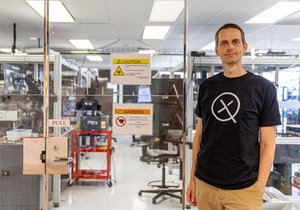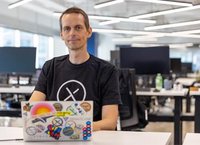A&S alum Nathan Killoran wants to make sure no one is left behind when quantum computers transform life as we know it.
From revolutionizing drug discovery to enhancing financial modelling and our understanding of world economies, this technology — which leverages quantum mechanics to solve complex problems that today’s computers can’t handle — is advancing rapidly and possibly only years away from being commercially available.
Killoran, who earned his master of science degree from the Department of Mathematics, in the Faculty of Arts & Science, is developing software that allows everyday users to access quantum hardware.
“We’re trying to make quantum computing more accessible,” says Killoran, chief technology officer of software at Xanadu, a U of T-supported startup set to lead the quantum computing sector.
“My job is to dream up cool ways to use quantum technology and prepare and empower people to use it,” he says. “My hope is that with the tools we develop, you’ll feel like a quantum expert within months.”

Though quantum computing is an emerging sector, Killoran has been preparing for a career in the field for years.
When he first learned about quantum computing — in the mid-2000s, well before it was on the minds of most mathematicians, engineers and physicists — he was immediately intrigued.
“I’ve always been fascinated by the prospect of taking the principles and ideas found in science textbooks to develop the next generation of technologies,” he says. “Quantum computing presented interesting possibilities.”
Though there were no career opportunities to pursue at the time — the industry didn’t exist yet — Killoran was confident a quantum revolution was on the horizon, and he set out to prepare for it as best he could.
Knowing he’d need a strong foundation in math to complement his physics knowledge, he pursued graduate studies at U of T, where he found a community of exceptional mathematicians.
“The quality and calibre of students was remarkable,” says Killoran. “It was intimidating and definitely humbling to be learning alongside such intelligent classmates.”
He’s also grateful to the supportive graduate administrators and the many professors who encouraged his curiosity at the intersection of math and physics. Many of their teachings still serve him today.
“I’m still referring to the ideas I first learned in my master’s,” he says. “I draw on the concept of Lie groups, a topic I explored during my summer term at U of T, in projects I’m working on now.”
His master’s positioned him well for a PhD in physics, which he completed at the University of Waterloo, and a postdoctoral fellowship in quantum computing at the University of Ulm in Germany. As he waited patiently for opportunities in quantum computing to surface, Killoran went on to tackle projects in AI and machine learning.
Throughout the years, as he was steadily advancing in his career and expanding his knowledge in AI, Killoran kept following quantum research and science news — scanning to see if there were any startups breaking into the space. But his searches always turned up empty.
Just when it seemed like it was time to give up on the quantum dream, Killoran got a call from Xanadu. Finally, the moment he had been waiting for had arrived: the quantum computing sector was coming.
His patience and preparation paid off. Today, he has his dream job: working with the technology he has long been fascinated by and making it accessible to everyone.
“We are still a few years away from seeing quantum computing as a commercialized technology, and software development plays a part in compressing that timeline,” he says. “Developing new hardware is an iterative process. Hopefully, what we’re learning about on the software side can inform the design process.”
Reflecting on his career and the path that led him to Xanadu, he offers encouraging advice to those aspiring for a similar career in tech.
“I’ve found it’s best to have a sense of what you’re working toward and staying true to that. You might take a circuitous path, and sometimes it’s not a direct line to your goal. But look for opportunities to progress and meet your greater career ambitions,” he says.
“I’ve learned you’ve got to just keep pushing for the things you want. When opportunities present themselves to you, don't let them slip away.”

